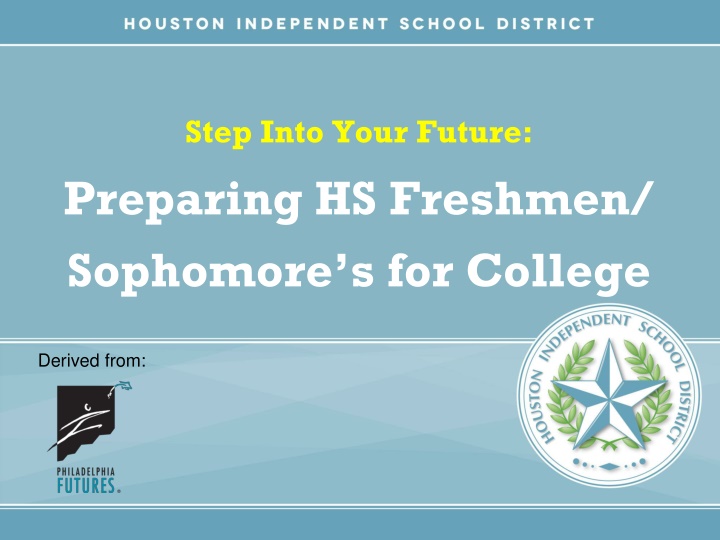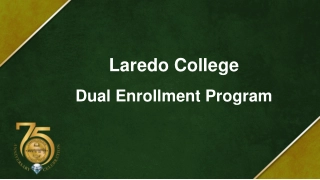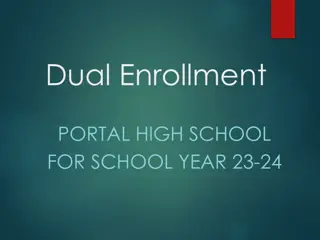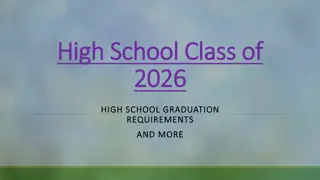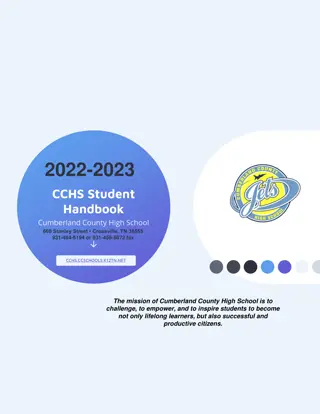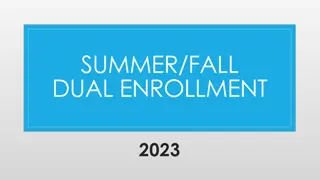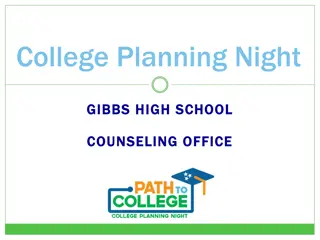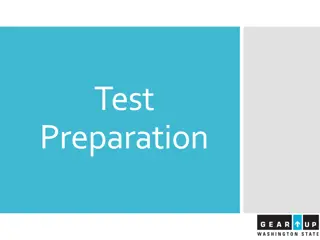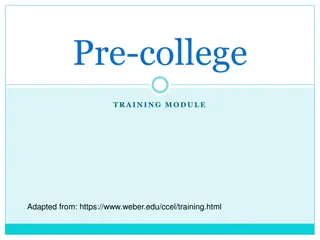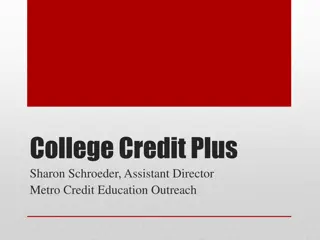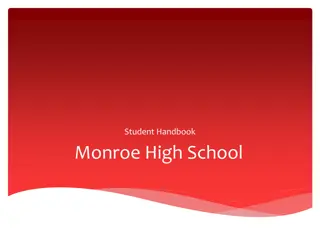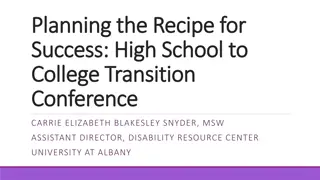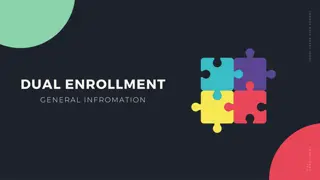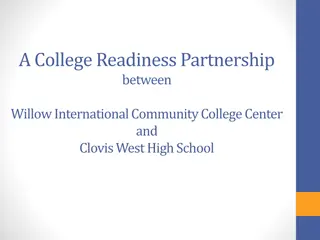Steps to Prepare High School Students for College
Prepare high school freshmen and sophomores for college by focusing on academic readiness, becoming a well-rounded student, setting smart goals, seeking assistance, understanding Naviance, excelling in standardized tests, and creating a college preparation checklist. Challenges include taking demanding courses, participating in pre-college programs, and developing effective study skills. Encourage students to plan ahead and engage in opportunities that enhance their college readiness.
Download Presentation

Please find below an Image/Link to download the presentation.
The content on the website is provided AS IS for your information and personal use only. It may not be sold, licensed, or shared on other websites without obtaining consent from the author.If you encounter any issues during the download, it is possible that the publisher has removed the file from their server.
You are allowed to download the files provided on this website for personal or commercial use, subject to the condition that they are used lawfully. All files are the property of their respective owners.
The content on the website is provided AS IS for your information and personal use only. It may not be sold, licensed, or shared on other websites without obtaining consent from the author.
E N D
Presentation Transcript
Step Into Your Future: Preparing HS Freshmen/ Sophomore s for College Derived from:
Preparing for College STEP 1: Prepare Yourself Academically STEP 2: Become a Well-Rounded Student STEP 3: Impress for Success STEP 4: Set Smart Goals STEP 5: Assistance from the College Corner STEP 6: Understanding Naviance STEP 7: Get Ready to Take Standardized Admissions Tests Conquering the SAT and ACT STEP 8: Make Your College Preparation Checklist 2
STEP 1: Prepare Yourself Academically
STEP 1: Prepare Yourself Academically Challenge Yourself Select the most demanding courses your high school offers. Take four years of math, science, English and social studies. Ask your guidance counselor if the following options are available in your school and are appropriate for you: Advanced or Honors Classes: These courses are designed to prepare students for college. They are more demanding and require a more rigorous workload than basic-level courses. Advanced Placement (AP) Classes: AP classes are college-level classes that are offered in high school. Upon completion of an AP course, you take an AP exam. Qualifying scores may earn college credits. International Baccalaureate (IB) Classes: IB classes are based upon an international curriculum that places emphasis on in-depth subject mastery.
STEP 1: Prepare Yourself Academically Challenge Yourself Pre-College Summer Enrichment Programs: These programs, hosted by colleges, offer opportunities for high school students to experience college life and discover schools that fit their needs. Students also may qualify for college credit depending on the program. Dual Enrollment Classes: Some high schools allow students to take classes at a local college to receive both high school and college credit. Futures Tip for Success: You need to plan ahead. Meet with a teacher or counselor to plan course options well in advance.
STEP 1: Prepare Yourself Academically Develop Effective Study Skills Building study skills in high school will strengthen your grades and consequently, your college applications. Strong study skills also will prepare you to handle college coursework. Reading: Read more than you are assigned in school. Reading skills will help you with writing, reading comprehension and standardized testing. Visit the following websites for suggested reading lists: www.read.gov/teens Note taking: Note taking is essential for college success. When reading for classes, write down main ideas and key details in your own words to help you understand the material. Take notes while in class to remember your teacher s points.
STEP 2: Become a Well-Rounded Student
Step 2: Become a Well-Rounded Student Be an Active Member of Your Community Colleges seek to admit students who will make meaningful contributions to campus life. By being active in your high school and community, you demonstrate your potential for being a leader. Extracurricular Activities: Participate in your high school s clubs, sports or performing arts programs. Sustained involvement and holding leadership positions in extracurricular activities demonstrate commitment and initiative. Community Service: Volunteer at an organization whose mission inspires you. Colleges look for individuals who see themselves as part of the broader community. Jobs and Internships: Having a part-time job or an internship shows responsibility and maturity and gives insight into careers. Futures Tip for Success: Remember to keep your school work as your number one priority. Also document these activities in a resume format.
STEP 3: Impress for Success
Step 3: Impress for Success Make the Right Impression Part of becoming college-ready is making a positive first impression and carrying yourself as a college-bound student. Make eye contact when you talk to people. Have a firm handshake. Sit in the front of the class and ask questions. Dress professionally. Have an appropriate email address. Maintain appropriate behavior in and out of the classroom. Be sure your Facebook, Twitter and Instagram profiles are appropriate.
STEP 4: Set Smart Goals
Step 4: Set Smart Goals Get in the practice of setting goals for yourself. Think about your ultimate objective: success in college and your career. Setting goals will propel you forward. Make sure your goals are SMART: Specific- There is a specific goal that you want to achieve Measurable- Your progress can be measured Attainable - The goal should be possible to achieve Realistic - A realistic goal is something that is reasonable for you to do Time-Related - You have a time frame for achieving your goal SMART goals are helpful in school, sports and in your personal life.
STEP 5: Assistance from the College Corner
Lamars College Corner East Building-in the Library Assistant Principal: Jorge Martin: JMARTI74@houstonisd.org Parent and Community Liaison: Norma Alicia Alderete: NALDERET@houstonisd.org College Access Coordinator: Sue Ling: cgranger@houstonisd.org College Success Advisor(s): Mike Minter: mminter@houstonisd.org Samantha Brusnighan sbrusnig@houstonisd.org 14
STEP 6: Understanding Naviance
STEP 6: Understanding Naviance www.naviance.com 16
STEP 7: Get Ready to Take Standardized Admissions Tests Conquering the SAT and ACT
Step 7: Get Ready to Take Standardized Admissions Tests Conquering the SAT and ACT Most colleges require you to submit standardized test scores. Plan to take the SAT or ACT in the spring of your junior year and once again in the fall of your senior year. The SAT Reasoning Test Measures writing, math and evidence-based reading. The SAT is scored on a scale of 200 to 800, (two sections), for a possible perfect score of 1600. Test dates can be found at http://sat.collegeboard.org. The ACT The ACT is a content-based college entrance exam that tests your knowledge of English, math, science, reading and offers an optional writing component. The ACT is scored on a scale of 1 to 36, for a possible perfect score of 36 in each section. Test dates can be found at www.actstudent.org. Futures Tip for Success: Practice. Practice. Practice. There are many resources to help you prepare for the exams, including Khan Academy, which offers free test prep for the SAT: www.khanacademy.org/testprep/sat.
STEP 8: Make Your College Preparation Checklist
Step 7: Make Your College Preparation Checklist It may seem like a long way off, but now is the time to begin planning for college. Be a college-bound student. Talk to your parents or guardians about your college plans. Begin to research and visit colleges together. Make sure that you are enrolled in the most challenging courses available at your high school. Read books, websites and online newspapers to build your vocabulary and knowledge base. Join clubs and activities that are of interest to you. Volunteer at an organization in your community. Set short- and long-term goals for yourself. Carry yourself as a college-bound student. Begin preparing for the SAT and ACT. Register to take the exam for the first time in the spring of your junior year.
Thank you Date: 3/22/2016 Presenter: Michael Minter College Success Advisor
